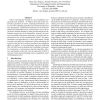Free Online Productivity Tools
i2Speak
i2Symbol
i2OCR
iTex2Img
iWeb2Print
iWeb2Shot
i2Type
iPdf2Split
iPdf2Merge
i2Bopomofo
i2Arabic
i2Style
i2Image
i2PDF
iLatex2Rtf
Sci2ools
149
click to vote
RTAS
2007
IEEE
2007
IEEE
Real-Time Divisible Load Scheduling for Cluster Computing
Cluster computing has emerged as a new paradigm for solving large-scale problems. To enhance QoS and provide performance guarantees in cluster computing environments, various real-time scheduling algorithms and workload models have been investigated. Computational loads that can be arbitrarily divided into independent pieces represent many real-world applications. Divisible load theory (DLT) provides insight into distribution strategies for such computations. However, the problem of providing performance guarantees to divisible load applications has not yet been systematically studied. This paper investigates such algorithms for a cluster environment. Design parameters that affect the performance of these algorithms and scenarios when the choice of these parameters have significant effects are studied. A novel algorithmic approach integrating DLT and EDF (earliest deadline first) scheduling is proposed. For comparison, we also propose a heuristic algorithm. Intensive experimental re...
Related Content
| Added | 04 Jun 2010 |
| Updated | 04 Jun 2010 |
| Type | Conference |
| Year | 2007 |
| Where | RTAS |
| Authors | Xuan Lin, Ying Lu, Jitender S. Deogun, Steve Goddard |
Comments (0)

